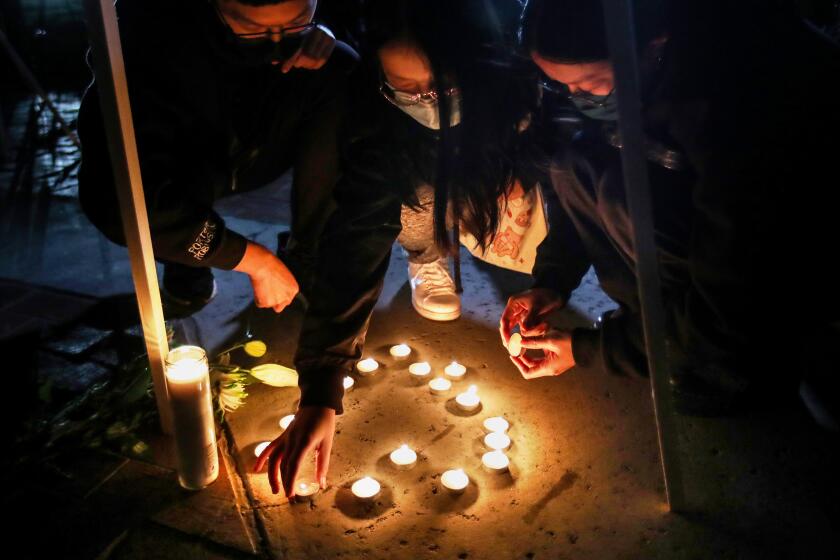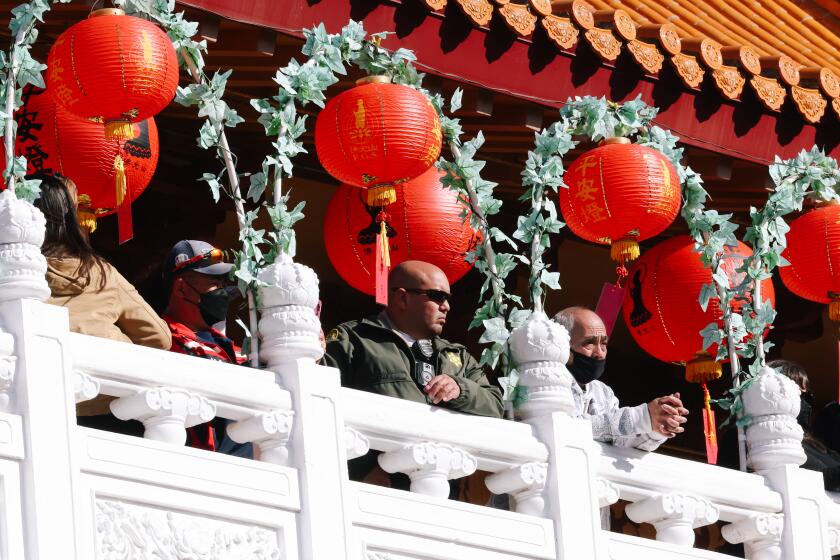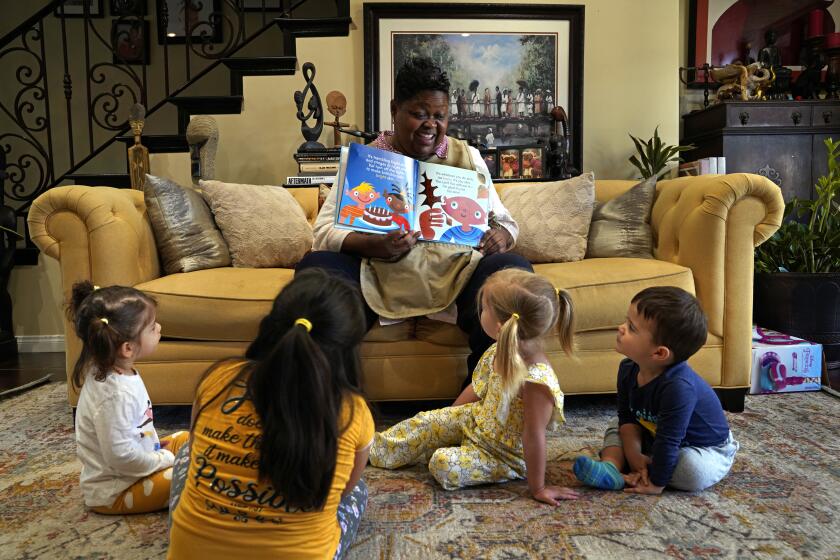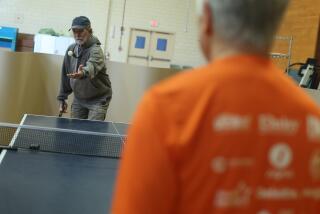Asian seniors should keep dancing — and other advice on how to rebuild after a tragedy
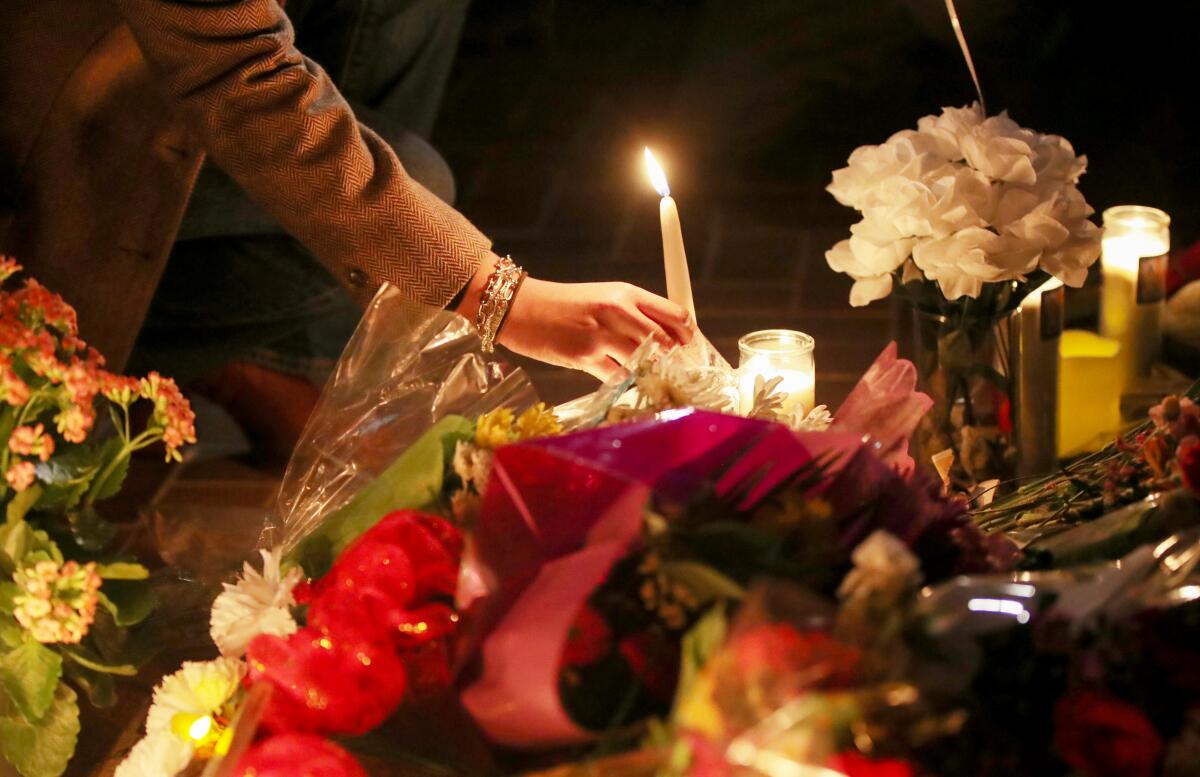
- Share via
The Year of the Rabbit — or Cat, in the Vietnamese zodiac — is supposed to bring a more peaceful time. But this year’s Lunar New Year celebrations were interrupted by two mass shootings.
The victims of the Monterey Park shooting included first-generation Asian American immigrants in their 50s, 60s and 70s — a strong, resilient community.
“I think in this generation,” said Phuong Tang, a therapist at Yellow Chair Collective in Los Angeles, “what they had to do a lot was just survive” — building safer and more prosperous lives for the next generations of their families. So it is heartbreaking, she added, to think about seniors being attacked while doing something joyful and healthful for themselves.
Yes, healthful. Even if seniors don’t consider the exercise they do and the parties they have with their friends as mental health care, these activities are great ways to take care of both body and mind.
What’s most important now is finding balance, Stanford University psychologist Helen Hsu tells her senior patients.
“So if your mind and body get out of balance, you need to be proactive to get back in balance,” she tells her patients. That means: physically (your body), psychologically (your mind) and socially (your family and friends), she said.
It’s also healthy to take time to grieve, said Paul Hoang, who runs the Moving Forward Psychological Institute in Fountain Valley, but don’t avoid the activities that are good for your health. If you can’t go back to the dance studio, find other ways to get exercise, relax and keep connected with your friends.
It’s also important to understand that even people who weren’t directly affected by the recent violence may feel worried, sick or afraid.
Here’s a checklist of questions to ask yourself, based on advice from Hsu, Hoang, Tang and her Yellow Chair Collective colleague Jessie Li.
Asian Americans across the country are anguishing over the recent mass shootings, in which older Asian men have allegedly opened fire on other Asians.
1. Are you taking care of yourself physically?
In order to help take care of your family and friends, you need to make sure you take care of yourself.
Eating healthfully and getting enough sleep are basics that can be forgotten when stressed.
“Just like in Chinese medicine, noticing disturbances in your appetite and your sleep are key,” Hsu said. “Some of us eat our feelings; some of us stop eating.”
Especially if it goes on for weeks, this is a sign that you or your loved one may be unwell.
Continue with your routines, Hoang said.
Cultural rituals and traditions are helpful, as well, during times of stress. Some families have altars in their homes and light incense. Some go to temples or churches to pray. These practices can help to remember those you mourn and to celebrate their lives.
2. Are you avoiding social interactions out of fear?
Some seniors enjoy being alone. But humans often need to feel connected to other people to stay healthy.
“It’s very healing to have a way to express and gather,” Hsu said.
Can you organize an event at a senior center? A lunch at a local restaurant? A small gathering at home?
While you’re there, make it a point to ask everyone to describe how they are feeling and tell stories, Li said.
The experts also recommend movement for well-being, especially for the Monterey Park community members who already express themselves through dance.
“The longer they stay away from dancing, the more probability of being triggered and developing PTSD,” Hoang said. “It’s important to restore their sense of security in their hobby. You don’t want that activity to be associated with this negative event.”
It’s like you’re overwriting the hard disk with new memories, Tang said. Don’t forget that you have many good memories at that place, and fill it up with more good memories.
People have heard of post-traumatic stress disorder, but there’s also post-traumatic growth, Tang said. Perhaps this tragedy will fill someone with a sense of purpose to keep their community safe.
“I think with anyone, regardless of age, it’s about always connecting and feeling like you’re a part of something,” she said.
On Lunar New Year, bad news is taboo. For Elizabeth Wong, finding out about the shooting near her Monterey Park home was a culturally shattering moment.
3. Are you checking in on your friends and loved ones?
Seniors’ challenges can be invisible, Li said. Younger generations might have issues at school or conflicts at work, but seniors can struggle alone.
Remind your friends and family that they play a huge role in the health of their elders, and they can be helpful just by checking up on them and making sure they have someone to talk to.
4. Are you feeling aches in your body?
Seniors are very in tune with their bodies, Tang said. If there is a new ache that won’t go away, many will go to a doctor to get some medicine or prevent it from worsening.
People who experience trauma can also feel it in their bodies, she said. So keep in mind that if you or your friend have a stomachache or headache that won’t go away, this could be related to emotional stress, she said.
5. Do you need more professional help?
It’s not a sign of weakness to ask for help. It’s a way to regain strength.
Many immigrants are more comfortable talking to someone who speaks their first language. Find someone who understands your cultural history and background, Hoang said.
If you don’t like one therapist, find another. It’s about finding the right match. You wouldn’t stay with a doctor who wasn’t helping you heal.
Some Asian American immigrants also feel more comfortable talking to a professional from their home country, Hsu said. Now that many appointments can be done online, it’s easier to see a therapist from Taiwan, for example.
6. Are you being patient with yourself or loved ones who aren’t feeling well?
After a tragic event, many people are in shock and survival mode. Many may think that they’re handling it pretty well — and they might be. But they might be overwhelmed by grief months later, a year later, in an unexpected place when they get an unexpected reminder.
That’s normal, Hsu said. What has happened is irreparable for many of these families.
“We often, as therapists, talk about grief and loss and the stages of grief, and it’s not a linear process,” Tang said. “You don’t go from denial to bargaining to anger to acceptance. You kind of jump around, and eventually you land on hope.
“But it takes time to get there, so have compassion for yourself and for others. And patience.”
A list of crisis hotlines, low-fee and sliding scale counseling, support groups, and mindfulness and meditation services
More to Read
Get Group Therapy
Life is stressful. Our weekly mental wellness newsletter can help.
You may occasionally receive promotional content from the Los Angeles Times.
